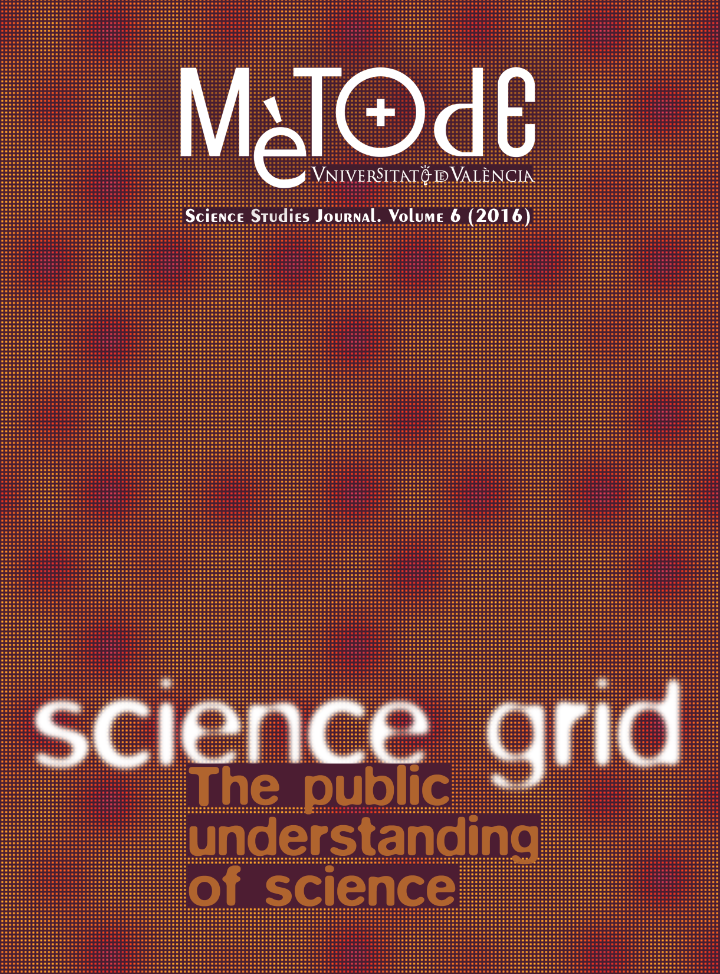Scientific ethos and the cinematic zombie outbreak: Science in fictional narratives
DOI:
https://doi.org/10.7203/metode.6.4472Keywords:
rhetoric of science, frontier of science, science fiction, viral pandemics, public attitudes toward science Abstract
Abstract
Public anxiety about emerging biothreats is evident in the recent glut of popular entertainment where the demise, or near demise, of humankind is imagined to be the result of a new infectious pathogen against which science has no existing vaccine or cure. This article examines the figure of the scientist in such fictional narratives and what these characterizations indicate about public attitudes toward science in our contemporary world. It focuses in particular on the image of the scientist as clumsy naïve, immoral experimenter, heroic savior, and self-reflexive ethical agent.
 Downloads
Downloads
 References
References
Boluk, S., & Lenz, W. (2010). Infection, media, and capitalism: From early modern plagues to postmodern zombies. The Journal for Early Modern Cultural Studies, 10, 126–147.
Boyle, D. (Director), & Macdonald, A. (Producer). (2002). 28 days later [motion picture]. United Kingdom: Fox Searchlight Pictures.
Ceccarelli, L. (2013). On the frontier of science: An American rhetoric of exploration and exploitation. East Lansing, MI: Michigan State University Press.
Collins, F. S. (2005, August 7). Exploring the frontiers of life: Northwest at forefront of pioneering effort to mine the secrets of the human genome. The Seattle Times. Retrieved from: http://www.seattletimes.com/opinion/exploring-the-frontiers-of-life
Forster, M. (Director), Bryce, I., Gardner, D., Kleiner, J., & Pitt, B. (Producers). (2013). World War Z [motion picture]. United States: Paramount Pictures and Skydance Productions.
Halperin, V. (Director), & Halperin, E. (Producer). (1932). White zombie [motion picture]. United States: A Victor and Edward Halpern Production.
Haynes, R. (2003). From alchemy to artificial intelligence: Stereotypes of the scientist in Western literature. Public Understanding of Science, 12, 243–253. doi: 10.1177/0963662503123003
Klosterman, C. (2010, December 3). My zombie, myself: Why modern life feels rather undead. New York Times. Retrieved from: http://www.nytimes.com/2010/12/05/arts/television/05zombies.html?pagewanted=all&_r=0
Lawrence, F. (Director), Goldsman, A., Heyman, D., Lassiter, J., & Moritz, N. H. (Producers). (2007). I am legend [motion picture]. United States: Warner Brothers Pictures.
Romero, G. A. (Director), Hardman, K., & Streiner, R. (Producers). (1968). Night of the living dead [Motion Picture]. United States: An Image Ten Production.
Watts, E. K. (2014). ‘The incessant moan’: Reanimating zombie voices. Carroll C. Arnold Distinguished Lecture 2013. Washington D. C.: National Communication Association. Retrieved from: https://www.natcom.org/uploadedFiles/Convention_and_Events/Annual_Convention/NCA Manuscript 2014_FINAL.pdf
Weingart, P. (2003). Of power maniacs and unethical geniuses: Science and scientists in fiction film. Public Understanding of Science, 12, 279-287. doi: 10.1177/0963662503123006
Downloads
Published
How to Cite
-
Abstract1625
-
PDF1679
Issue
Section
License
![]()
All the documents in the OJS platform are open access and property of their respective authors.
Authors publishing in the journal agree to the following terms:
- Authors keep the rights and guarantee Metode Science Studies Journal the right to be the first publication of the document, licensed under a Creative Commons Attribution-NonCommercial-NoDerivatives 4.0 International License that allows others to share the work with an acknowledgement of authorship and publication in the journal.
- Authors are allowed and encouraged to spread their work through electronic means using personal or institutional websites (institutional open archives, personal websites or professional and academic networks profiles) once the text has been published.





